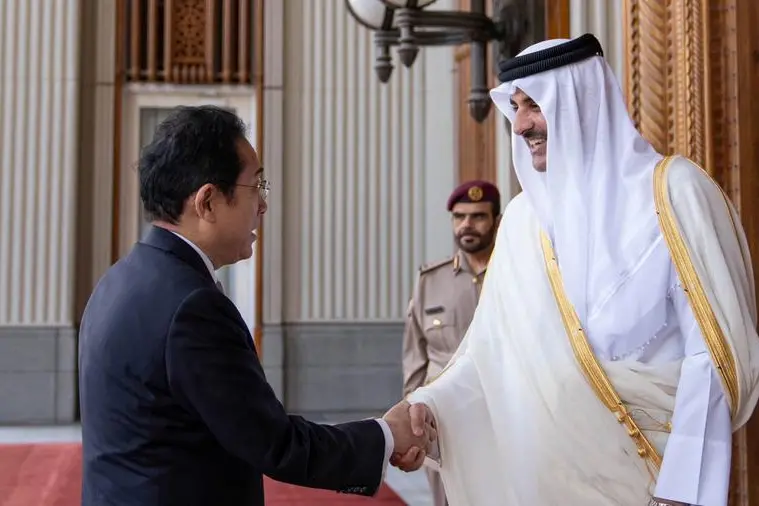PHOTO
Seven documents on bilateral co-operation were signed during Prime Minister Fumio Kishida’s visit to Saudi Arabia, the UAE and Qatar, marking a significant step toward deepening ties in various sectors with the Gulf states.
Aimed at supporting the economic and industrial diversification efforts of the Gulf nations, Kishida said these agreements cover advanced technology, semiconductors, outer space, healthcare, education, culture, and tourism.
Speaking at a press conference held at Sheraton Grand Doha Resort & Convention Hotel Tuesday, he said such co-operation extends “beyond the realm of our governments” with more than 50 memoranda signed between Japanese and Gulf companies.
“In advanced areas such as the decarbonisation, acceleration of innovation and partnerships between startups is crucial,” he stressed.
The Japanese prime minister highlighted the importance of security co-operation during his visit to the three Gulf countries, citing that Qatar is increasing its presence on the international stage driven by its diplomatic efforts in recent years.
Kishida agreed with the Gulf states to engage in more frequent diplomatic and security dialogues and deeper co-operation in international fora. These include regular meetings at the foreign ministerial level between Japan and the Gulf Co-operation Council (GCC).
He added that he also met with Hissein Brahim Taha, secretary-general of the Organisation of Islamic Co-operation (OIC), underlining the importance of dialogue and partnership with regional organisations for stability in the Middle East.
“The OIC with 57 countries in its membership played an active role to remove violent extremism and has outstanding influence towards the stabilisation of the Middle East,” Kishida said.
The state visits, he noted, also aim to strengthen cultural exchanges and people-to-people connections by agreeing to work towards a significant increase in the number of students from the Gulf countries studying in Japan. The co-operation will also witness enhancing ties in culture, sports, education, and science.
“My counterparts and I agree to aim towards a significant increase in the number of students from the three Gulf countries to Japan which plunged due to the Covid-19 pandemic, and deepen our relations in culture and sports, education, science, and other areas referred to as soft power,” he said.
Kishida, who also brought 27 representatives from various Japanese companies during his visit, met with His Highness the Amir Sheikh Tamim bin Hamad al-Thani, as well as the delegation’s business counterparts in Qatar.
The Japanese prime minister said he considered the visit to be highly meaningful, building upon the discussions held at the G7 Hiroshima Leadership Summit in May. The outcomes of the visit contribute to Japan's ongoing efforts to strengthen co-operation with Gulf nations and to promote stability, economic growth, and cultural exchange in the region.
© Gulf Times Newspaper 2022 Provided by SyndiGate Media Inc. (Syndigate.info).Aimed at supporting the economic and industrial diversification efforts of the Gulf nations, Kishida said these agreements cover advanced technology, semiconductors, outer space, healthcare, education, culture, and tourism.
Speaking at a press conference held at Sheraton Grand Doha Resort & Convention Hotel Tuesday, he said such co-operation extends “beyond the realm of our governments” with more than 50 memoranda signed between Japanese and Gulf companies.
“In advanced areas such as the decarbonisation, acceleration of innovation and partnerships between startups is crucial,” he stressed.
The Japanese prime minister highlighted the importance of security co-operation during his visit to the three Gulf countries, citing that Qatar is increasing its presence on the international stage driven by its diplomatic efforts in recent years.
Kishida agreed with the Gulf states to engage in more frequent diplomatic and security dialogues and deeper co-operation in international fora. These include regular meetings at the foreign ministerial level between Japan and the Gulf Co-operation Council (GCC).
He added that he also met with Hissein Brahim Taha, secretary-general of the Organisation of Islamic Co-operation (OIC), underlining the importance of dialogue and partnership with regional organisations for stability in the Middle East.
“The OIC with 57 countries in its membership played an active role to remove violent extremism and has outstanding influence towards the stabilisation of the Middle East,” Kishida said.
The state visits, he noted, also aim to strengthen cultural exchanges and people-to-people connections by agreeing to work towards a significant increase in the number of students from the Gulf countries studying in Japan. The co-operation will also witness enhancing ties in culture, sports, education, and science.
“My counterparts and I agree to aim towards a significant increase in the number of students from the three Gulf countries to Japan which plunged due to the Covid-19 pandemic, and deepen our relations in culture and sports, education, science, and other areas referred to as soft power,” he said.
Kishida, who also brought 27 representatives from various Japanese companies during his visit, met with His Highness the Amir Sheikh Tamim bin Hamad al-Thani, as well as the delegation’s business counterparts in Qatar.
The Japanese prime minister said he considered the visit to be highly meaningful, building upon the discussions held at the G7 Hiroshima Leadership Summit in May. The outcomes of the visit contribute to Japan's ongoing efforts to strengthen co-operation with Gulf nations and to promote stability, economic growth, and cultural exchange in the region.





















